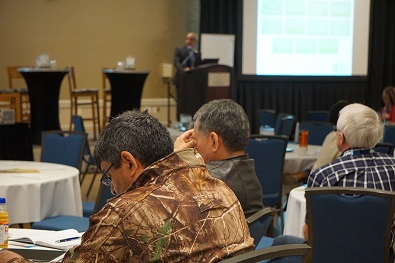Attendees listen to a presentation on rural and remote housing at the SEDA conference. Photo by Chelsea Laskowski
At the Creating Intersections for Growth conference, even presentations that aren’t focused on First Nations people or northerners are providing lessons that apply to both groups.
For example, American man Tim Fry, owner of 456 Communications, spoke about travelling the United States while developing a cellphone app that brings out local consumers as well as tourists to invest time and money into a local economy.
He said those travels led him to meet and bring attention to a long-standing Indigenous museum in the states after meeting the museum’s creator.
“It was just fascinating, and I learned more about the history of our state and the Indigenous people of our state than I ever had learned up to that point. And it was all just by seeking out this local storyteller,” Fry said.
While Fry is American, he said mining-based communities and others can find ways to tell their people’s stories and history in a way that draws people in.
The Saskatchewan Economic Development Association (SEDA) conference started on Wednesday with presentations that included Shaun Soonias, the Executive Director of the Saskatchewan First Nations Economic Development Network, speaking about Treaty Land Entitlements and their relationship to business.
Anjeil Hunt has a point to make when it comes to this week’s conversations on impact benefit agreements between business and First Nations, on cultural competency, and on promoting First Nations hiring.
“Do you think things are a lot different now than it was say 10 or 15 years ago? Yes. Would we be having this conversation 15 years ago? No,” she said in a speech at the conference.
Hunt, a First Nations woman from British Columbia, has started a business called Transformational International that bridges the gap between the business objectives of a corporation and the cultural and social objectives of Indigenous people.
“I believe now that relationship is starting to be built and especially I think a big impetus of that would be around the court cases that have been won across the country. And it’s really forced the hand of industry to take on that corporate-social responsibility, whether they like it or not,” she said in an interview afterwards.

Anjeil Hunt presents at the Creating Intersections for Growth conference. Photo by Chelsea Laskowski.
Also, Roch Labelle with the Alberta Rural Development Network spoke on affordable housing for rural and remote areas.
He said there are a lot of barriers for people to move from social housing to affordable housing. This includes prejudice on the part of building owners and managers who opt not to rent to single men or young mothers, and then those people move to cities, Labelle said.
He said community groups on a grassroots level are among the best ways to find and afford upgrades to housing and new builds. He said funding is available for those interested, but marketing and a proper business plan are essential.
The event wrapped up on Thursday afternoon with SEDA’s annual general meeting.
